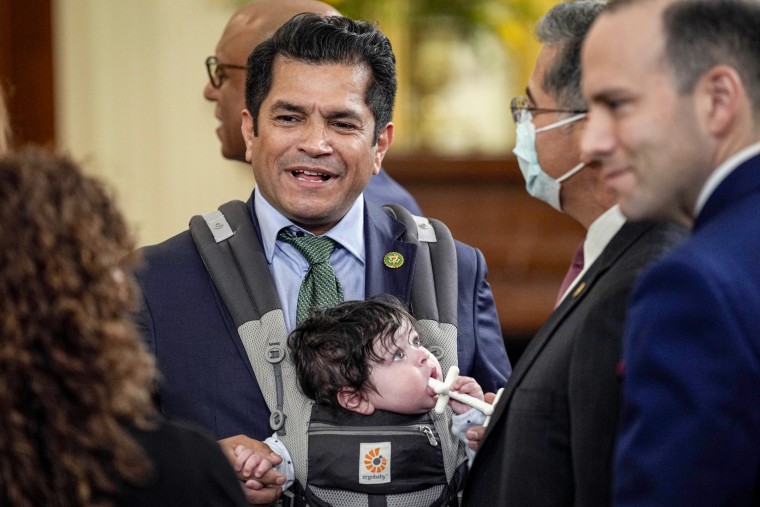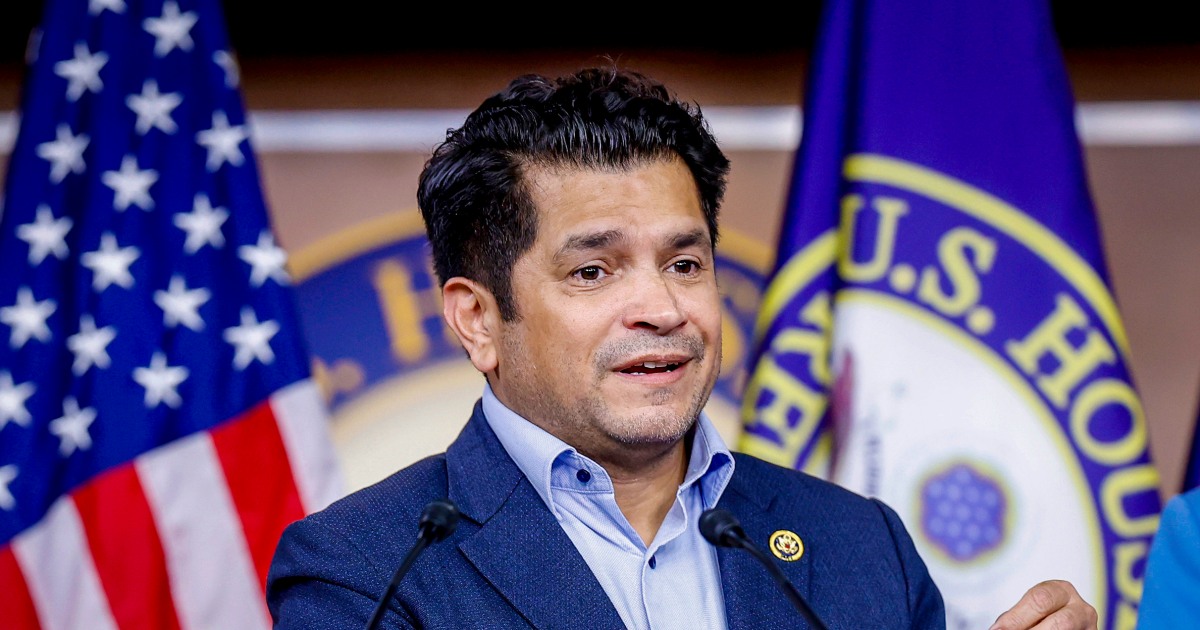The memorable image of Dads Caucus founder Rep. Jimmy Gomez bringing his baby in a carrier to the House floor last year may seem a far cry from the manosphere and “bro” culture around President-elect Donald Trump and his substantial gains with male voters, especially Latino men.
But Gomez, a Democrat from California, thinks his and his fellow Dads Caucus members’ focus is on point with voters, especially working-class men.
“People are starting to recognize the value of the Dads Caucus — of having men who are fathers, men who are raising kids right now, to be involved in policy discussions,” Gomez said.
The caucus, currently made of 39 Democratic lawmakers — but open to Republicans, too — champions family policies such as family leave, affordable child care and the child tax credit.
“We saw how inflation and the rise of grocery prices was hurting families, because we saw it impact our own families,” he said. “I have a 2-year-old son now, and over the last few years his food has gotten way more expensive, and I’ve even seen my own savings go down as the food goes up, my savings went down, down, down. And no matter what, you can’t make enough.”
The caucus members, Gomez said, provide a kind of “sample and access” to American families throughout the country.
Gomez’s California district is diverse in income, race and ethnicity. It includes downtown Los Angeles, Latino-majority Boyle Heights, and Koreatown. Gomez won re-election this month against fellow Democrat David Kim, a progressive immigration lawyer.
Trump gained a larger share of Latino voters this presidential election and that shift was more marked among men. According to NBC News’ exit polls of 10 key states, 55% of Latino men voted for Trump.
But Gomez said he’s seen the rightward shift by Latino voters happening for over a decade, even in California, a reliably blue state. During this past election cycle, Americans, including Latinos, expressed deep concerns about the economy in polls.

“What happened in this election is that the economy was terrible for working people. No matter how much you work, you’re falling behind because the prices kept going up and up and up,” Gomez said.
He drew a comparison with his upbringing. His parents worked four to five jobs a week to make ends meet, but they were able to own their own home, even if it meant someone had to sleep in the garage.
But now, Gomez said, housing and childcare alone can take up to 60% of someone’s income before taxes, “so there’s really nothing left. You can’t really save to start a small business, to buy a house, to do anything — I feel we need to do more to talk about those issues, especially housing, especially childcare. What are we going to do to help them?”
Gomez said men have a certain pressure to provide for the family and, when they can’t, they become open to listening to “anything anyone says.” He said when his sister eloped and returned with her husband, the only question their father had for him was: ‘Do you have a job?’
On the post-election debates and controversy around whether misogyny played a part in Trump’s gains among male voters — especially Latino men — Gomez said, “Don’t blame, learn. Learn from their experiences. Learn from their pain. … Is there a portion of that? Of course, it’s there, but does it explain the whole reason? I don’t think it does. And if you only blame it on that, then you’re never going to change how you govern.”
He insisted that the shift toward Republican candidates has been coming over time, as he’s seen in California, and this has been the case with Democratic male voters too.
The Dads Caucus has 39 House members and three have been elected to the U.S. Senate (Adam Schiff, D-Calif., Andy Kim, D-N.J., and Ruben Gallego, D-Ariz.), which now makes them a bicameral caucus. All the members are Democrats, but Gomez said one Republican showed interest in joining before the elections. “I’ll have that conversation with him again to see if he’s still willing to join — we’re open to Republicans,” Gomez said.
He said the caucus is pragmatic and supported the House GOP package that expanded the child tax credit earlier this year.
“When they negotiated with the Senate Democrats that expanded the child tax credit, it was a win, but it wasn’t what we would have written as Democrats. We supported it because we knew that even getting something to the pockets of workers right away was going to help,” said Gomez.
The Dads Caucus is expanding the areas they work in. Gomez said they recently discussed research on how social media has more of a negative impact on young men than young women, since young women “pull out of it in a way that young men don’t. … It kind of stuck with a lot of us — we were all thinking they’re fine,” he said, referring to young men. “And what we see is a lot of that alienation, that isolation that comes when a lot of social media use continues, and they never pull out of that trend.”
Gomez said the caucus is looking for ways to deal with this through policies or programs specifically targeted to help young men.
For Gomez, the caucus is not just about co-sponsoring legislation, but about leading the discussion and fighting for the bills.
“The tough part about politics is one, you have to get Republicans and Democrats to agree that there is a problem, or see the problem the same way, and then two, you have to get legislation that both sides agree on, and I think that there are emerging consensus on a bunch of issues,” Gomez said, adding that he’s working on a bipartisan bill to convert commercial and real estate buildings for residential use. “Housing is one of them.”








